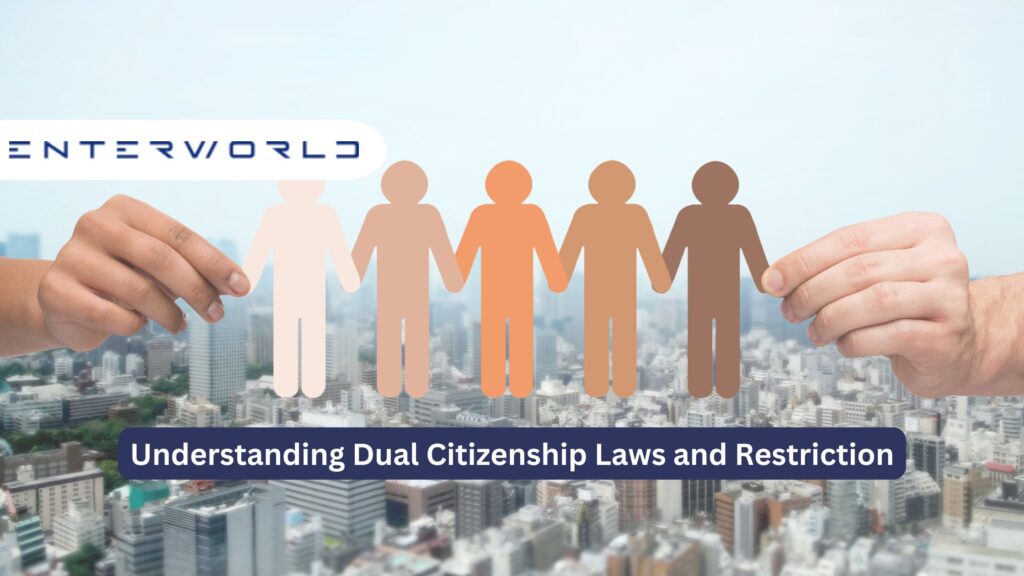In an increasingly globalized world, many individuals are considering the benefits of holding multiple citizenships. Dual citizenship allows a person to be a citizen of two countries simultaneously, which can offer expanded rights, freedoms, and opportunities. However, understanding dual citizenship laws and the restrictions surrounding them is crucial before pursuing this option. One way to obtain multiple citizenships is through Citizenship by Investment, a popular path for those seeking enhanced global mobility.
What is Dual Citizenship?
Dual citizenship means that an individual is legally recognized as a citizen by two countries at the same time. As a dual citizen, you hold rights and responsibilities in both countries, including the ability to live, work, and travel freely in each nation. While dual citizenship offers significant advantages, such as the ability to access benefits in both countries, it can also come with obligations like paying taxes in both countries or adhering to different legal systems.
Citizenship by Investment: A Path to Dual Citizenship
One of the fastest-growing routes to obtaining dual citizenship is through Citizenship by Investment (CBI) programs. These programs allow individuals to invest a certain amount of money into the economy of a country (often through real estate, business ventures, or government bonds) in exchange for citizenship. This method has become especially popular among high-net-worth individuals looking to enhance their global mobility, business opportunities, and access to different economic or financial markets.
Countries such as St. Kitts and Nevis, Antigua and Barbuda, and Malta offer Citizenship by Investment programs that can lead to dual citizenship. However, the specific requirements and benefits vary by country.
Laws and Restrictions Surrounding Dual Citizenship
While many countries recognize dual citizenship, not all do. Some countries have strict laws that either do not permit dual citizenship at all or limit the circumstances under which it can be acquired. It’s important to check the specific laws of both the country you’re from and the country you’re considering for citizenship to understand any restrictions.
-
Countries That Permit Dual Citizenship: Some countries, like the United States, Canada, and the UK, allow individuals to hold dual citizenship. However, these countries may still have restrictions on certain political offices, military service, or other government roles for dual citizens.
-
Countries That Do Not Permit Dual Citizenship: Other countries, such as Japan, China, and India, do not recognize dual citizenship. In these countries, acquiring a foreign citizenship typically requires giving up your original nationality.
Benefits of Dual Citizenship
- Global Mobility: Dual citizenship often grants visa-free or visa-on-arrival access to more countries, making travel and international business much easier.
- Access to Education and Healthcare: Citizens of certain countries can access the public education and healthcare systems, which may be more affordable or higher quality than in their home country.
- Tax Benefits: Depending on the countries involved, dual citizenship can offer tax advantages, such as eligibility for tax treaties or exemptions from certain taxes.
- Investment Opportunities: Dual citizenship often opens up business and real estate opportunities in both countries, allowing individuals to diversify investments in different markets.
Potential Drawbacks and Considerations
- Tax Obligations: Dual citizens may be required to file taxes in both countries, depending on their tax laws. This can lead to double taxation or complex tax filing requirements.
- Military Service: Some countries may require dual citizens to serve in their military, which could create conflicts if the countries involved are in a disagreement.
- Loss of Rights: In some cases, countries may limit certain rights or privileges for dual citizens, such as the ability to vote or hold public office.
How Citizenship by Investment Works
Citizenship by Investment offers a straightforward way to acquire a second citizenship, often with a relatively fast processing time. Here’s how it typically works:
-
Choose a Country: Research countries offering Citizenship by Investment programs. Countries such as the Caribbean nations (e.g., St. Kitts and Nevis) or European countries like Malta offer citizenship opportunities in exchange for significant investment.
-
Make the Required Investment: Investments can range from real estate purchases to contributions to national development funds. The amount varies depending on the country’s program.
-
Application Process: Applicants will submit the necessary documentation, undergo background checks, and possibly attend an interview to verify eligibility. The processing time for Citizenship by Investment programs can take anywhere from a few months to a year.
-
Obtain Citizenship: Upon approval, you will be granted citizenship and, in many cases, can apply for a passport from the new country, making it easier to travel or conduct business.
Conclusion
Dual citizenship offers individuals the opportunity to enjoy the benefits of multiple countries, including enhanced mobility, access to services, and investment opportunities. However, it’s important to be aware of the specific laws and restrictions governing dual citizenship in both your home country and the country in which you’re seeking citizenship. For those interested in a faster route to multiple citizenships, Citizenship by Investment programs provide an increasingly popular option to achieve this goal.
Before pursuing dual citizenship, it’s essential to fully understand both the advantages and potential restrictions, ensuring you make an informed decision about the best path forward.
Also Read: Minimum Investment Requirements for Residency by Investment Programs





